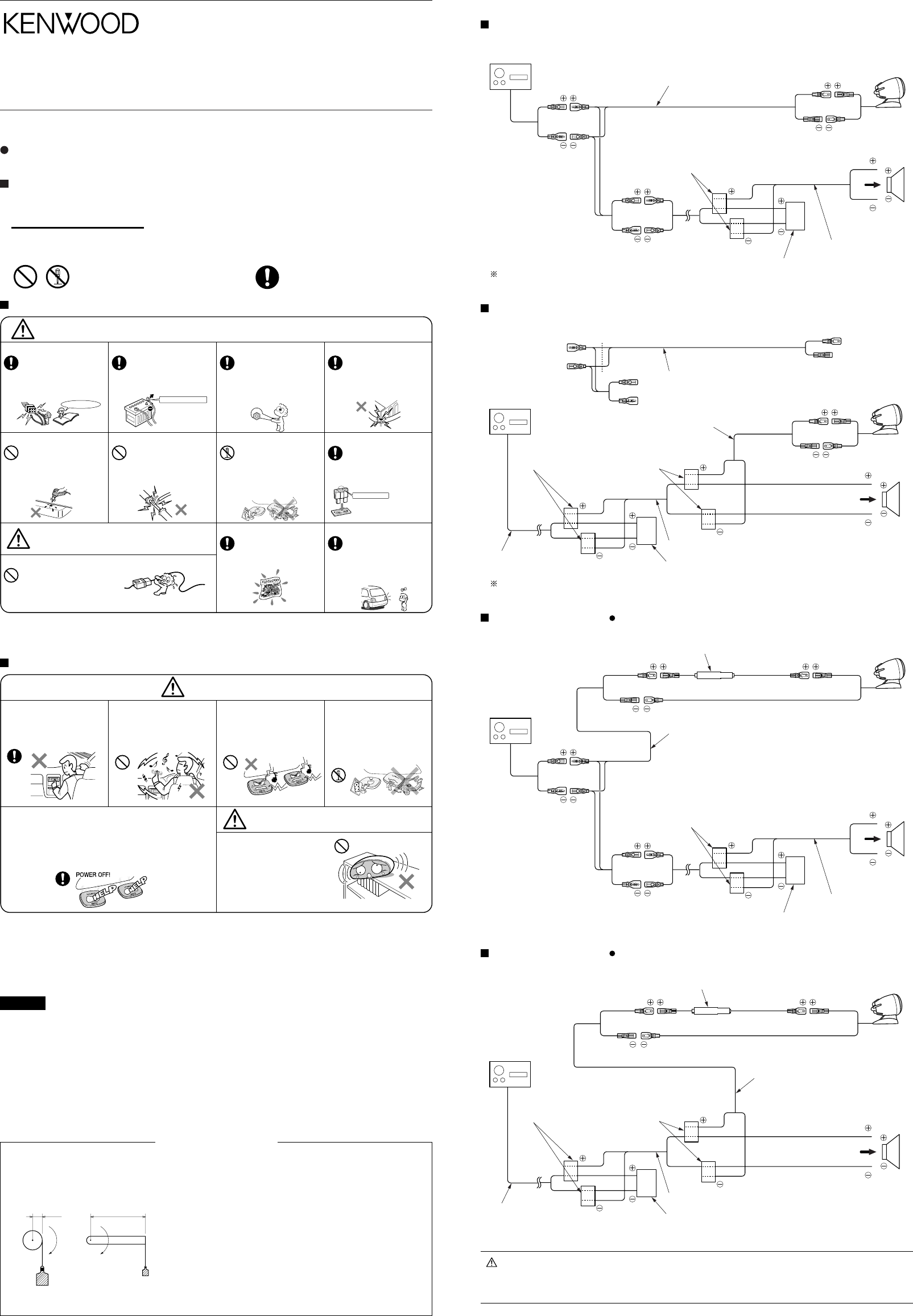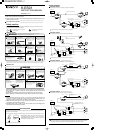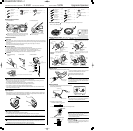
Thank you for purchasing this product.
Please read this instruction manual thoroughly before installing speakers, and
install speakers correctly.
Tools required for installation
Phillips screwdriver, Flat-head screwdriver, Clip driver, Pliers, Nippers, Wrench,
Electric hand drill and bits, Cutting knife, Electrical tape, Scissors, Felt-tip pen
Safety caution
Be sure to observe the warning and caution provided below as they are critical for your safety.
The meanings of the symbols are as follows.
SEPARATE CUSTOM FIT SPEAKER
K-ES01
INSTRUCTION MANUAL
KENWOOD CORPORATION
B54-1210-20 (FHP)
Installation cautions
If the product is handled erroneously by ignoring the instruction of this mark,
fatal hazard or serious injury on human body may result.
If the product is handled erroneously
by ignoring the instruction of this
mark, injury on human body, or dam-
age of product may result.
CAUTION
Work depending to instruction manual.
When installing or wiring the product,
be sure to follow strictly the instruction
and installation manuals of the product.
(If the instructions are not observed
strictly, the product may be displaced
and hit you during braking and there
may also be a risk of electric shock or
fire hazard.)
?
Please read thoroughly.
Be careful not to damage the tank and
electric wiring.
In case the product is installed by mak-
ing holes on the vehicle chassis, be
careful never to damage the gasoline
tank, piping, electric wiring or other
parts of the vehicle.
(Otherwise fire hazard may result.)
Do not pull the cord.
When you remove the connector, please
remove and lock it with the connector
main part, without pulling the cord.
Otherwise disconnection of a cord and
poor contact may result.
Do not cut insulation tube in the middle
of a power cord.
Do not use power cord for other prod-
ucts by cutting insulation tube in the
middle of a power cord.
(Otherwise a shorting accident* may
occur, which could result in fire acci-
dent.)
Do not open the back and top covers of
the product or modify it.
(This may lead to fire hazard or other
accident.)
• For inspection and servicing, consult
your dealer or nearest KENWOOD ser-
vice agent or distributor.
• Servicing by the user may lead to fire
hazard or other accidents.
Use a fuse with the specified rating.
When the fuse is blown, first ensure that
there is no short-circuiting* between the
wired cords, then replace with a new
fuse with the capacity (Ampere value)
specified on the fuse box.
(Using other fuse than specified may
lead to fire hazard.)
• For fuse replacement, refer to the
owner's manual of your vehicle.
Please check the spec.
Use provided parts for installation.
Be sure to install a product using pro-
vided parts. When parts other than the
provided ones are used, a product may
fall off and hit the passenger while driv-
ing, causing injury or product breakage.
Inspect the vehicle after installation.
After installation of the product, be sure
to check that the brake lamps, head
lamps, direction indicators, windshield
wipers, power window, etc. of the vehi-
cle function normally.
(If any of the vehicle functions are dam-
aged due to incorrect wiring , etc., traf-
fic accident may result. )
Remove battery connection before work.
Before installing or wiring anything, be
sure to remove the cable from the nega-
tive terminal of the battery.
(Otherwise a shorting accident* may
occur, which could result in fire acci-
dent.)
Remove negative terminal.
Use proper tools for the processing
objects.
When tightening a bolt or nut, always be
sure to use the tool matching its size. If
the securing torque of a part is speci-
fied, be sure to secure it with the speci-
fied force.
(Otherwise the bolt or nut may be dam-
aged or detached during use.)
Wrap cords with protective tape.
The cords near metallic parts of the
vehicle should be protected against
sharp edge of the metallic parts by
wrapping insulating tape around them.
(If a cord is damaged, electric shock or
short-circuiting* as well as fire hazard
may result.)
* Short-circuiting and shorting accident
Short-circuiting refers to the direct connection between the positive and negative poles of electricity. This may occur when a stripped cord (electric wiring) comes in
contact with another cord or metallic part of vehicle. Short-circuiting may produce spark, which may be caught by surrounding objects and result in fire hazard.
Cautions on use
WARNING
Operate the car audio after stopping
the vehicle.
The car audio system should be operated after
having stopped the vehicle in a safe place.
(Operating it while driving a vehicle may lead
to traffic accident.)
Should any of the following abnormal phenom-
ena is observed, immediately stop the use and
operation of the product.
• No sound output.
• Water is spilt on the product.
• A foreign object such as metal or a piece of
paper gets inside the product.
Do not use the product for other purpose
than car use.
This product has been designed for installation and
operation in a vehicle. Do not use it for other pur-
pose.
(Otherwise imperfect installation may cause the
product to drop and cause injury.)
• The product starts smoking.
• Abnormal noise or odor is produced.
(If the use of the product is continued, fire haz-
ard or other accident may result.)
In this case, immediately switch the power off,
check safety and consult your dealer or nearest
KENWOOD service agent or distributor.
Do not use loud volume.
During driving, do not turn the listening vol-
ume too high at which you cannot hear the
sound outside the vehicle.
(You may be unable to notice what is happen-
ing outside the vehicle, and a traffic accident
may result. )
Do not continue sound output at an
abnormal level.
Do not use the speakers for a long period at a
high volume level at which the sound is dis-
torted.
(The system may be overheated and fire haz-
ard may result. )
Do not open the back and top covers of
the product or modify it.
(This may lead to fire hazard or other acci-
dent.)
• For the inspection and servicing, consult your
dealer or nearest KENWOOD service agent or
distributor.
• Servicing by the user may lead to fire hazard
and other accidents.
These indicate what must not be done.
(Inhibition marks)
This indicates what must be done.
(Imperative mark)
• Please install depending to this instruction manual. Please keep it carefully after fin-
ishing reading this. It is better to keep this manual together with the owner's manual
of your vehicle.
• For inquiries on installation, please consult your dealer or nearest service agent.
• Refer to guidance on attached sheet for inquiry about the product to our company.
1. When installing in some types of a car, it is necessary to remove the seat belt. It is
necessary to mount the bolt which fixes a seat belt by the specified force. For
inquiries on torque, please consult your dealer or your car shop.
2. When installing in some types of a car, you have to install using an installation kit.
For inquiries, please consult your dealer.
3. Depending on the year or grade of a car, some vehicles may have changed parts.
For inquiries, please consult your dealer.
Caution
Connection example 4
If the tweeter level is too high.
Tweeter connection from woofer. (Tweeter is installed on the door panel.)
Connection example 3
If the tweeter level is too high.
Tweeter connection from center unit. (Tweeter is installed on the dashboard.)
Center unit
8
Erectro-tap (for woofer)
Refer to "Woofer connections" in this instruction manual.
Tweeter
Woofer
Speaker output
~Connection cord
(for woofer)
6Connection cord (for tweeter)
Black/Gray
Black/Gray
Black/Gray
Black
Black
Black
Red
Black
Black/Gray
Black/Gray
Black
Black/Gray
Black
Vehicle connector
Black/GrayBlack/Gray
Black
7Sound Level Adjuster
(for tweeter)
Center unit
8Erectro-tap (for woofer)
Refer to "Woofer connections" in this instruction manual.
Woofer
~Connection cord (for woofer)
6Connection cord which is cut
(for tweeter)
Refer to “Connection exsample 2”.
Black/Gray
Black
Black/Gray
Black
Vehicle connector
Connection cord
of vehicle
Black/Gray
Black
Black
Red
Tweeter
Black/Gray
Black
Black/GrayBlack/GrayBlack/Gray
Black
7Sound Level Adjuster
(for tweeter)
Caution
• The terminal which is not used should be protected by electrical tape for shorting accident prevention.
• Be careful of the polarity of plus/minus and connect depending to the connection example.
"The power to twist something" is called "torque."
Two persons grip each end of one bat, and twist in opposite direction, respectively. In this case, the person with the
thick bat side is more advantageous.
Thus, even if using the same force, turning something with a large radius will have larger twisting strength, or torque.
[Bolting torque of a screw] ; The power in which an adult tightens a
screw normally using an ordinary screwdriver is 1-2N·m (0.1-0.2kgf·m).
[Bolting torque of a bolt] ; The torque when tightening a bolt by 25kg
power using a wrench is 49N·m (5kgf·m).
About bolting torque
1m
10kg
1kg
0.1m
Both are the same torque, 9.8N·m (1kgf·m).
Connection example 2
Tweeter connection from woofer. (Tweeter is installed on the door panel.)
System connections
Connection example 1
Tweeter connection from center unit. (Tweeter is installed on the dashboard.)
Center unit
8
Erectro-tap (for woofer)
Refer to "Woofer connections" in this instruction manual.
Tweeter
Woofer
Speaker output
~Connection cord
(for woofer)
6Connection cord (for tweeter)
Black/Gray
Black/Gray
Black/Gray
Black
Black
Black
Red
Black
Black/Gray
Black
Black/Gray
Black
Vehicle connector
Center unit
8Erectro-tap (for woofer)
Refer to "Woofer connections" in this instruction manual.
Woofer
~Connection cord (for woofer)
6Connection cord which is cut
(for tweeter)
Black/Gray
Black
Black/Gray
Black
Vehicle connector
Connection cord
of vehicle
6Connection cord (for tweeter)
Black/Gray
Black
Black
Red
Cut
Tweeter
Black/Gray
Black
The high path filter for a tweeter is built in the main part of a tweeter.
The high path filter for a tweeter is built in the main part of a tweeter.
CAUTION
WARNING
Immediately stop operation in case of abnormality.




